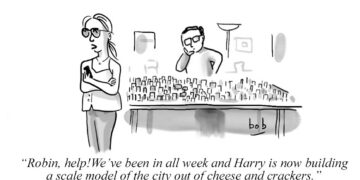
By Wendy Blake
A theatrical version of Ray Bradbury’s dystopian 1953 novel “Fahrenheit 451” is finishing a run on the Upper West Side this week — appropriately, perhaps, as a presidential election takes place.
Fahrenheit 451 depicts a society in which books are banned, and burned, and readers are hunted down — a world in which people have lost all empathy and connection to their humanity.
The play begins menacingly, with a group of figures in chrome-yellow uniforms, their faces covered, taking the stage. These are the firemen, but their job is not to extinguish fires but to start them — to burn books, which have become illegal to possess in this fictional society. As flickering flames, then a conflagration, are projected onto the rear of the stage, the protagonist, Montag (Hazen Cuyler), extols the beauty and power of burning — how it “provides answers to everything. … Problems solved.”
The novel, written during the Cold War, is a clear warning about totalitarianism, but Bradbury always insisted he was more concerned about thought control coming from the bottom up. He was also troubled by technology’s (at that time, television’s) dehumanizing effects.
With industrial capitalism hurtling people “pell-mell” into the 20th century, says the fire chief, Beatty (Frank Hankey), they had no time to read. Furthermore, he says — explaining the origins of the book-banning mandates — in a country of hundreds of millions, where each individual could demand the suppression of texts they found offensive or which contradicted their views, censorship was effectively accomplished without state interference. “451” refers to the temperature at which paper combusts on its own.
Then, a totalitarian state, seizing on these movements in order to suppress independent thought, made it a crime to own books and set out to destroy all trace of them.

The fire chief’s language in the staged version, which Bradbury himself adapted in the late 1970s, is far more virulent than in the book. And though Bradbury became a darling of conservatives for his condemnations of “political correctness,” he expanded Beatty’s rant in the play to include, among many others, Republicans who want to burn the Communist Manifesto.
The play runs through November 9 at St. Michael’s Episcopal Church on West 99th Street and Amsterdam Avenue. It’s a production of The Greenhouse Ensemble, a cultural organization whose projects range from plays and film to music and art. Austin Pendleton, renowned director, actor, and playwright, has praised Greenhouse, founded 11 years ago by Upper West Sider Hazen Cuyler, for its “adventurous programming” and called it a “very promising asset to the future of our theater.”
Cuyler decided to stage Fahrenheit 451 because of its emphasis on the need for empathy in a world where characters engage more with technology than with other people. We are in a “constant state of escapism,” Cuyler said. Whether it’s screens or material goods, “we care about objects more than actual human beings,” he said in an interview with the Rag. “We forget we’re alive.”
Previous Greenhouse shows have been presented at UWS venues such as the Franciscan Community Center, Goddard Riverside’s Bernie Wohl Center, and the Center at West Park. Cuyler learned about St. Michael’s performance space through an organization called Partners for Sacred Spaces. Greenhouse, which is splitting proceeds from this show with St. Michael’s, is seeking funds to improve the space there with risers, sound and lighting equipment, and more.
Currently, the company gets by on about $5,000 a year in donations, “an immense amount of generosity,” and “scrappiness,” said Cuyler. “No one is doing this because they think an agent is going to come down from the clouds and cast them. They care because it’s important for them to create meaningful art,” he said.
Fahrenheit 451 will be performed Thursday through Saturday at 7:30 p.m., with a Saturday matinee at 2 p.m. at St. Michael’s Church, at 225 W. 99th Street. Tickets are available for $23.18 at The Greenhouse Ensemble website.
Subscribe to West Side Rag’s FREE email newsletter here.









What a staggeringly timely development! Thank you very much for this post, Wendy; I only wish I’d heard about it sooner.
“Fahrenheit 451 depicts a society in which books are banned, and burned, and readers are hunted down — a world in which people have lost all empathy and connection to their humanity.” Hmm, this world sounds oddly familiar….
@ecm
You’ve never heard of Fahrenheit 451 till now? I guess you won’t be impacted by the society portrayed there.
“Timely”? What, you heard through the trusted channels that the new administration will be burning books?
To coin a phrase, It Is Happening Here:
https://pen.org/book-bans/
Banning is not burning, of course, but for those hoping to read a given book the result is the same. One sees from the map that Florida and Iowa are by far the most zealous practitioners, but note the 65 instances of book bans right here in New York state; we even lead Texas in the number of school districts that banned a book.
I can’t imagine that eliminating the Department of Education, as is the current plan, will improve the situation — except from the perspective of the book-banners!
To answer your first question: In fact, I first read the novel c. 1972 and had no doubt heard of it before that. My reference earlier was to the current stage adaptation, not Bradbury’s novel. Sorry for any confusion.
https://www.newsweek.com/missouri-book-ban-burning-flamethrower-valentina-gomez-1867666
But we are in NYC here. I can also make irrelevant comments about things that happen in ultra leftist California areas…
Banning (or burning) books is irrelevant? To a post concerning “Fahrenheit 451”? Hmm.
For some reason, “Fahrenheit 451” (the novel) is now at #18 on Amazon. Perhaps it’s connected in some inscrutable fashion with sales of “The Handmaid’s Tale” (the novel) rising by 6,866% over the past week to #3, or the equally rapid ascent of “Nineteen Eighty-Four” (the novel) to #13. All of these have been widely banned, of course. Interesting times, as they apocryphally used to say in ancient China.